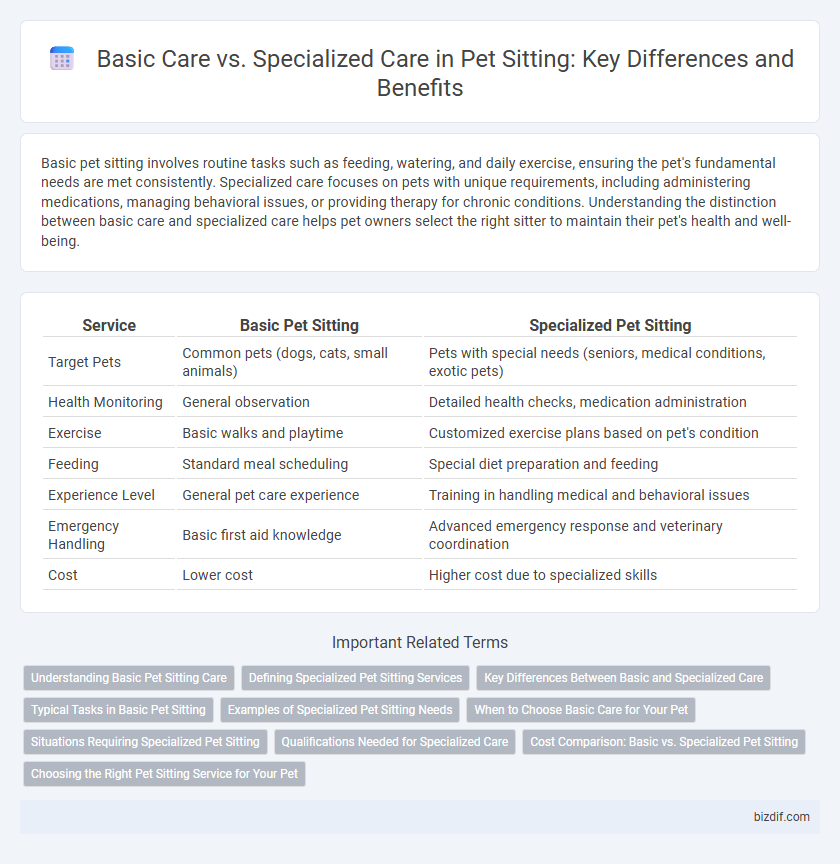Basic pet sitting involves routine tasks such as feeding, watering, and daily exercise, ensuring the pet's fundamental needs are met consistently. Specialized care focuses on pets with unique requirements, including administering medications, managing behavioral issues, or providing therapy for chronic conditions. Understanding the distinction between basic care and specialized care helps pet owners select the right sitter to maintain their pet's health and well-being.
Table of Comparison
| Service | Basic Pet Sitting | Specialized Pet Sitting |
|---|---|---|
| Target Pets | Common pets (dogs, cats, small animals) | Pets with special needs (seniors, medical conditions, exotic pets) |
| Health Monitoring | General observation | Detailed health checks, medication administration |
| Exercise | Basic walks and playtime | Customized exercise plans based on pet's condition |
| Feeding | Standard meal scheduling | Special diet preparation and feeding |
| Experience Level | General pet care experience | Training in handling medical and behavioral issues |
| Emergency Handling | Basic first aid knowledge | Advanced emergency response and veterinary coordination |
| Cost | Lower cost | Higher cost due to specialized skills |
Understanding Basic Pet Sitting Care
Basic pet sitting care includes feeding, providing fresh water, cleaning litter boxes or cages, and ensuring pets get regular exercise and bathroom breaks. Understanding these fundamental responsibilities helps maintain a pet's daily routine and well-being. Specialized care, such as administering medication or managing chronic conditions, requires additional knowledge and skills beyond basic pet sitting tasks.
Defining Specialized Pet Sitting Services
Specialized pet sitting services cater to animals with unique medical or behavioral needs, such as administering medications, managing chronic conditions, or providing therapy for anxiety. These services require trained caregivers equipped with knowledge of veterinary instructions and emergency protocols to ensure safe and effective care. Unlike basic pet sitting, which covers feeding and exercise, specialized care offers tailored support addressing specific health challenges and individual pet requirements.
Key Differences Between Basic and Specialized Care
Basic pet care includes everyday tasks like feeding, walking, and grooming that maintain a pet's health and comfort. Specialized care involves handling specific medical conditions, dietary needs, or behavioral issues requiring trained knowledge and equipment. The key difference lies in the level of expertise and attention tailored to individual pet health complexities.
Typical Tasks in Basic Pet Sitting
Typical tasks in basic pet sitting include feeding, providing fresh water, administering medications as prescribed, and ensuring the pet's comfort and safety. Routine activities such as walking dogs, cleaning litter boxes, and offering companionship are essential components. These fundamental duties contrast with specialized care, which may involve handling medical treatments, behavioral training, or accommodating pets with chronic illnesses.
Examples of Specialized Pet Sitting Needs
Specialized pet sitting needs include administering medications, managing chronic conditions like diabetes, and providing post-surgical care that require trained professionals. Pets with behavioral issues such as anxiety or aggression may also need experts skilled in calming techniques and safe handling. Advanced services often involve feeding special diets, assisting with physical therapy, or monitoring vital signs to ensure the pet's well-being.
When to Choose Basic Care for Your Pet
Basic care for your pet is suitable when your animal requires routine services such as feeding, walking, and general supervision, ensuring their daily needs are consistently met. Opt for basic care during short trips or when your pet is healthy and does not have special medical conditions or behavioral challenges. Selecting basic care providers who understand standard pet needs helps maintain your pet's well-being without the complexity of specialized interventions.
Situations Requiring Specialized Pet Sitting
Basic pet sitting includes feeding, watering, and daily exercise, suitable for healthy pets without special health concerns. Specialized pet sitting addresses situations requiring medical treatment, mobility assistance, or behavioral management, often involving pets recovering from surgery, chronic illness, or senior animals with age-related needs. Professional specialized pet sitters possess training in administering medications, handling medical equipment, and providing tailored care plans to ensure pet safety and comfort.
Qualifications Needed for Specialized Care
Specialized pet care requires advanced qualifications beyond basic pet sitting skills, including certifications in pet first aid, animal behavior training, and experience with medical needs like administering medication or managing chronic conditions. Professional pet sitters offering specialized care often complete courses recognized by veterinary organizations to ensure proper understanding of specific breeds, disabilities, or behavioral issues. These qualifications ensure they can provide comprehensive, safe, and attentive care tailored to pets with unique health or emotional requirements.
Cost Comparison: Basic vs. Specialized Pet Sitting
Basic pet sitting services typically include feeding, watering, and light exercise, generally costing between $15 to $30 per visit. Specialized pet sitting, which may involve administering medication, providing physical therapy, or caring for exotic or senior pets, can range from $40 to $75 per visit due to the extra training and attention required. Cost differences reflect the complexity and skills involved, making specialized care essential for pets with unique health or behavioral needs while basic care suits routine visits.
Choosing the Right Pet Sitting Service for Your Pet
Basic pet sitting provides essential services such as feeding, walking, and monitoring general health, ideal for pets with standard care requirements. Specialized pet sitting includes tailored support for pets with medical needs, behavioral issues, or advanced age, ensuring proper medication administration and customized routines. Choosing the right pet sitting service depends on assessing your pet's specific care needs and selecting providers with expertise in the required level of care.
Basic care vs Specialized care Infographic

 bizdif.com
bizdif.com